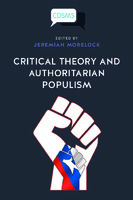Critical Theory and Authoritarian Populism
| dc.contributor.editor | Morelock, Jeremiah | |
| dc.date.accessioned | 2019-01-17 23:55 | |
| dc.date.accessioned | 2018-12-01 23:55:55 | |
| dc.date.accessioned | 2019-10-24 10:35:25 | |
| dc.date.accessioned | 2020-04-01T10:57:46Z | |
| dc.date.available | 2020-04-01T10:57:46Z | |
| dc.date.issued | 2018 | |
| dc.identifier | 1004051 | |
| dc.identifier | OCN: 1084276662 | en_US |
| dc.identifier.uri | http://library.oapen.org/handle/20.500.12657/26034 | |
| dc.description.abstract | After President Trump’s election, BREXIT and the widespread rise of far-Right political parties, much public discussion has intensely focused on populism and authoritarianism. In the middle of the twentieth century, members of the early Frankfurt School prolifically studied and theorized fascism and anti-Semitism in Germany and the United States. In this volume, leading European and American scholars apply insights from the early Frankfurt School to present-day authoritarian populism, including the Trump phenomenon and related developments across the globe. Chapters are arranged into three sections exploring different aspects of the topic: theories, historical foundations, and manifestations via social media. Contributions examine the vital political, psychological and anthropological theories of early Frankfurt School thinkers, and how their insights could be applied now amidst the insecurities and confusions of twenty-first century life. The many theorists considered include Adorno, Fromm, Löwenthal and Marcuse, alongside analysis of Austrian Facebook pages and Trump’s tweets and operatic media drama. This book is a major contribution towards deeper understanding of populism’s resurgence in the age of digital capitalism. | |
| dc.language | English | |
| dc.relation.ispartofseries | Critical Digital and Social Media Studies | |
| dc.subject.classification | thema EDItEUR::J Society and Social Sciences::JB Society and culture: general::JBF Social and ethical issues::JBFA Social discrimination and social justice | en_US |
| dc.subject.classification | thema EDItEUR::J Society and Social Sciences::JH Sociology and anthropology | en_US |
| dc.subject.classification | thema EDItEUR::J Society and Social Sciences::JH Sociology and anthropology::JHB Sociology::JHBA Social theory | en_US |
| dc.subject.classification | thema EDItEUR::J Society and Social Sciences::JM Psychology::JMH Social, group or collective psychology | en_US |
| dc.subject.classification | thema EDItEUR::J Society and Social Sciences::JP Politics and government::JPA Political science and theory | en_US |
| dc.subject.classification | thema EDItEUR::J Society and Social Sciences::JP Politics and government::JPH Political structure and processes | en_US |
| dc.subject.other | Populism | |
| dc.subject.other | authoritarianism | |
| dc.subject.other | Frankfurt School | |
| dc.subject.other | critical theory | |
| dc.subject.other | social media | |
| dc.subject.other | Trump | |
| dc.title | Critical Theory and Authoritarian Populism | |
| dc.type | book | |
| oapen.identifier.doi | 10.16997/book30 | |
| oapen.relation.isPublishedBy | 2725c638-53f3-4872-9824-99c3555366f3 | |
| oapen.relation.isFundedBy | 9e6c8be9-9f16-4ab9-a630-f368a5b55dc1 | |
| oapen.relation.isbn | 9781912656219; 9781912656042; 9781912656066; 9781912656073 | |
| oapen.series.number | 9 | |
| oapen.pages | 298 | |
| oapen.place.publication | London | |
| oapen.identifier.ocn | 1084276662 |

